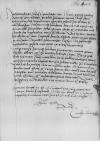List #3695
Christoph MÜLICH do Ioannes DANTISCUSAugsburg, 1531-03-09
Rękopiśmienne podstawy źródłowe:
Publikacje:
| ||||||||||||
Tekst + aparat krytyczny + komentarz Zwykły tekst Tekst + komentarz Tekst + aparat krytyczny
Dem Hochwirdigen Fursten und Herrn, Hern
Hochwirdiger Furst, Genediger Her.
Mein ganntz willig diennst sein Ewrn Gnaden zuvoran berait.
Auf denn XXIIII tag des verganngen monats cf.
Sunst waiss ich nicht sunders zuschreiben, meine herrn lassen Ewren G(enade)n ir willig diennst sagen, so ist Got hab lob mein sach nach dem holtz widerumb gut worden, versich mich als teglich von hie zuverrucken per
Datum
Ewer Gnaden gantz williger
Postscript:
Hiemit brieff an E(wren) G(enade)n lauttend hat


 BCz, 1595, p. 234
BCz, 1595, p. 234